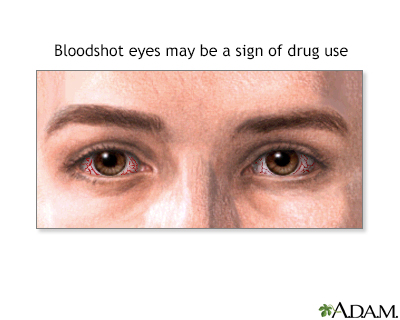Pregnancy SmartSiteTM
Teenagers and drugs; Symptoms of drug use in teenagers; Drug abuse - teenagers; Substance abuse - teenagers DefinitionAs a parent, it is natural to worry about your teenager. And, like many parents, you may be afraid that your teen may try drugs, or worse, become dependent on drugs or be injured by drug use. While you cannot control everything your teen does, you can take steps to help your child stay away from drugs. Start by learning all you can about drugs and drug use. Learn the signs of drug use so that you can be alert. Then use these tips to help prevent drug use in your teen. InformationFirst, learn about the different types of drugs that may be used. Older teens are more likely to use drugs than younger teens. Marijuana (pot, weed) is still common. More and more teens are using prescription drugs. WHY TEENS USE DRUGS There are many reasons why teens might use drugs. Some common reasons include:
TALKING WITH YOUR TEEN ABOUT DRUGS It is not easy, but it is important to talk with your teen about drugs. It is one of the best ways to prevent teen drug use. Here are some tips:
HELP PREVENT DRUG USE While there is no surefire way to make sure your teen never does drugs, you can take the following steps to help prevent it.
KNOW THE SIGNS There are many physical and behavioral signs that point to drug use. Learn them and be aware if your teen acts or looks different. The signs include:
You may notice changes in your teen's energy level, such as:
You also may notice changes in your teen's behavior:
HOW TO GET HELP If you think your teen is using drugs, start by talking with your family health care provider. Your provider can help treat your teen, or can refer you to a drug specialist or treatment center. You can also look for resources in your community or local hospitals. Look for a specialist who has experience working with teenagers. Do not hesitate, get help right away. The sooner you get help, the less likely your teen's drug use will turn into drug abuse. You can find more information at teens.drugabuse.gov. ReferencesBreuner CC. Substance use disorder. In: Kliegman RM, St. Geme JW, Blum NJ, et al, eds. Nelson Textbook of Pediatrics. 22nd ed. Philadelphia, PA: Elsevier;2025:chap 157. National Institute on Drug Abuse website. Parents & educators. nida.nih.gov/research-topics/parents-educators. Accessed July 14, 2025. Partnership to End Addiction website. Parent e-books & guides. drugfree.org/addiction-education. Updated April 2024. Accessed August 26, 2025. | |
| |
Review Date: 7/3/2025 Reviewed By: Linda J. Vorvick, MD, Clinical Professor Emeritus, Department of Family Medicine, UW Medicine, School of Medicine, University of Washington, Seattle, WA. Also reviewed by David C. Dugdale, MD, Medical Director, Brenda Conaway, Editorial Director, and the A.D.A.M. Editorial team. The information provided herein should not be used during any medical emergency or for the diagnosis or treatment of any medical condition. A licensed medical professional should be consulted for diagnosis and treatment of any and all medical conditions. Links to other sites are provided for information only -- they do not constitute endorsements of those other sites. No warranty of any kind, either expressed or implied, is made as to the accuracy, reliability, timeliness, or correctness of any translations made by a third-party service of the information provided herein into any other language. © 1997- A.D.A.M., a business unit of Ebix, Inc. Any duplication or distribution of the information contained herein is strictly prohibited. | |

 Signs of drug use
Signs of drug use
